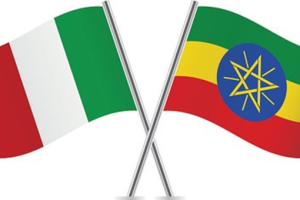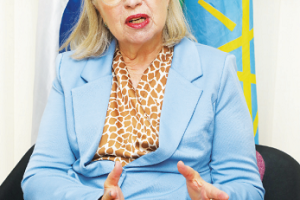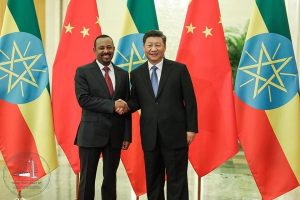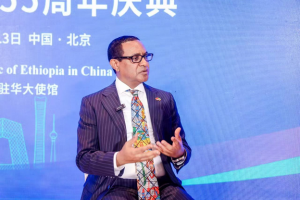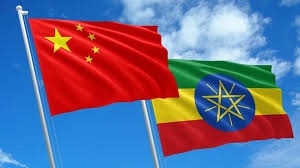
A 55 year of friendship was recently marked and Ethiopia and China enjoyed remembering the time when their tie commenced. A strong and deep bond has been bedecked with a firm stance to make this kith and kin further flourished. China is well known for its intention to establish a peaceful rapport with many countries, and so is Ethiopia for its potential of entertaining a color blind diplomatic relations with all nations of the globe—devoid of discrepancy in choosing the east or the west bloc.
Almost all countries of the world would love to cement bond with Ethiopia as a result of its stable scene, being endowed with a range of untapped natural resources, economical labor force, livable investment ecology, among others.
Yes, diplomatic relations between countries involve formal recognition, established through treaties or mutual agreement, and ongoing interactions through diplomatic missions and representatives. These relations definitely aim at facilitating communication, cooperation, and the peaceful resolution of disputes between nations. To a larger scale, diplomatic ties incorporate a number of dimensions for common growth and mutual benefit. What Ethiopia and China did have, have had, and even will have can be a living proof in this regard.
Undeniably, diplomatic ties and/or diplomatic relations refer to the official arrangements between two or more countries, typically involving the establishment of permanent missions, such as embassies and consulates, and the exchange of diplomatic personnel. These arrangements aim at smoothing communication, collaboration, and peaceful relations between nations, covering various aspects like trade, culture, and economic, social and even political cooperation.
Ethiopian Ambassador to China, Tefera Derbew recently said that as Ethiopia and China celebrate a remarkable 55 years of diplomatic relations, the deep-rooted, multifaceted and long-lasting connections that have flourished between the two nations, have to be well taken care of so as to fruitfully transcend to the generations to come.
This evolving partnership, the Ambassador noted, has matured into an all-weather strategic alliance, marked by robust cooperation and a shared commitment to advancing bilateral engagements across various sectors.
Ethiopia is tapping into the opportunity it has gained out of the firm tie with China, for instance, through the online Ethiopian National Pavilion, launched in January on a Chinese e-commerce site to boost agricultural exports.
According to Ambassador Tefera, economic, social, trade, investment and even cultural ties are worth citing in this regard. For instances, he said Ethiopian coffee, renowned for its organic and high-quality beans, remains vital to exports, with growing demand from China’s younger generation.
China is Ethiopia’s largest trading partner and largest source of investment and Ethiopia is China’s key trading partner in Africa.
He said, “The growing trade is fueled by enhanced connectivity through the Belt and Road Initiative, proposed by China more than a decade ago, and this would for sure boost our exports of agricultural commodities, coffee included, and other products.”
The electrified transnational railway from Addis Ababa to Djibouti, a flagship project of BRI cooperation, is facilitating trade; the ambassador said adding that BRI aligns well with the 10-Year Development Plan of Ethiopia (2021-30), which outlines Ethiopia’s vision and objectives for sustainable development.
Ambassador Tefera further said that China has been supporting Ethiopia’s energy sector, notably through hydropower dams evidenced by the Genale Dawa III project and wind projects like Adama Wind Farm.
“We are pursuing a green economic development path and encouraging electric vehicle usage in Ethiopia. Ethiopia’s abundant green energy resources, along with a population of over 120 million and a growing middle class, create strong potential many markets, bolstered by China’s expertise,” he added.
The bilateral relationship has evolved into an all-weather strategic partnership for over five decades, indeed! Ethiopians have benefited from this strong and deep partnership. Many job opportunities have been created through China’s trade and investment. These gains, he noted, stem from critical transportation and connectivity projects that help modernize Ethiopia, which require significant financing.
He said, “Ethiopia and China are keen to enhance their diplomatic relations. Yes, Ethiopia and China have enjoyed a strong partnership, evolving into an all-weather strategic alliance. We have seen iconic projects such as the Addis Ababa-Djibouti Railway, which stands as a testament to the strength of our collaboration.”
He also highlighted China’s significant support in Ethiopia’s energy sector, particularly through the Adama Wind Project. “Our relationship extends far beyond these sectors,” he emphasized, underscoring the diverse nature of the partnership.
In addition to economic collaboration, cultural exchanges between the two nations have flourished. Ethiopian students have pursued educational opportunities in China, benefitting from the rich academic environment there, he stated.
Notable initiatives such as the Confucius Institute and the Luban Workshop are also currently operational in Ethiopia, offering language education and vocational training.
According to the Ambassador, these programs are designed to enhance cultural ties, promote language learning, and facilitate knowledge transfer between the two countries. “These initiatives have led to significant knowledge transfer, cultural exchanges, and stronger people-to-people relations,” he added.
He also emphasized that over the past five and a half decades, Ethiopia and China have built a robust and mutually beneficial relationship that continues to strengthen and expand across various domains.
Since challenges faced by diplomats in maintaining diplomatic relations include managing conflicts and differences of opinion between countries are inevitable, diplomats have to be profound enough towards navigating complex political landscapes, dealing with sensitive information and negotiations, handling cultural differences and language barriers, and balancing multiple priorities and purposes.
Yes, diplomats must work to find common ground and compromise solutions that benefit both parties while also representing their own country’s interests. Without doubt, diplomats must understand the intricacies of international politics and how different governments operate, as well as the historical context and potential implications of various policies and actions. They must also navigate relationships between different government agencies and stakeholders within each country. Basically, both Ethiopian and Chinese ambassadors are working via taking all this fact into account and their countries have been entertaining a win-win trajectory.
Absolutely, for the effectiveness of the bilateral or trilateral ties of countries, diplomacy drivers need to handle confidential information from their own government or other governments, as well as negotiate delicate agreements and deals. This requires strong communication skills and the ability to maintain trust and confidence even in difficult situations.
They must also be able to communicate effectively across cultures and languages, often in environments where they do not speak the local language fluently. This requires sensitivity, adaptability, and a willingness to learn and understand different cultures.
True, balancing multiple priorities and objectives is essential for successful diplomacy. Hence, diplomats must manage competing demands and priorities from their own government, other governments, and various stakeholders, all while working towards shared goals and outcomes. This requires strong leadership, negotiation, and project management skills, as well as the ability to think creatively and strategically.
For sure, diplomats act as intermediaries between governments, representing their respective countries at international conferences, negotiations, and other events. That is what Ethiopia’s and China’s diplomats are doing right now.
In a nutshell, diplomats work to promote cooperation and understanding between nations, and their responsibilities include advising their government on foreign policy issues, conducting negotiations with other countries, representing their country at international meetings, and providing information and analysis on global developments.
As to him, diplomats also play an important role in promoting cultural exchanges and understanding between nations, organizing educational programs, and supporting humanitarian efforts. Overall, they are essential in maintaining peaceful relationships between nations and preventing conflict escalation.
In a nut shell, the diplomatic relations between Ethiopia and China can be an exemplary move towards nurturing a win-win approach as both Ethiopia and China are of significantly useful countries from which many others can draw important lessons in the field of diplomacy. Yes, the longstanding and firm ties of the two sisterly countries will further flourish and bear scrumptious fruits in the years to come.
BY MENGESHA AMARE
THE ETHIOPIAN HERALD TUESDAY 15 APRIL 2025


